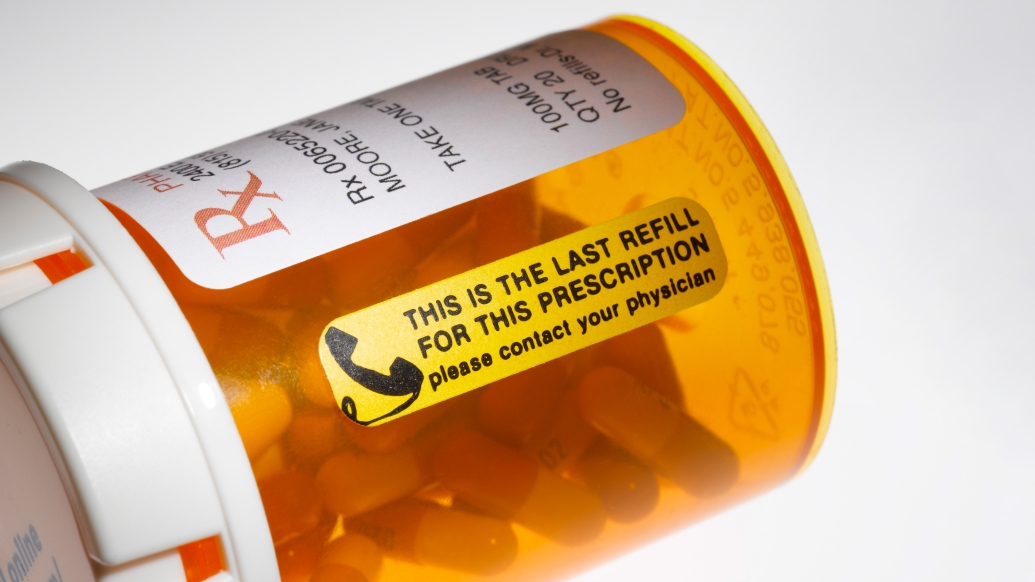PPI prescriptions for veterans dropped quickly, but some missed out on protective use; lack of reduction in supposed harms indicates PPIs may not be harmful as thought
11:10 AM
Author |

Whether it’s costs, safety risks or pill fatigue they’re trying to reduce, many health systems and clinics have started working on ways to encourage deprescribing of medications that patients may not need.
Now, a new study published in the BMJ shows the potential promise, and pitfalls, of a massive effort to reduce overuse of a common class of heartburn medications known as proton pump inhibitors or PPIs.
The findings also reveal that some of the feared risks from PPIs may be overblown.
The study tracks the impact of an intervention that imposed limits on PPI prescription size and refills for patients without a documented reason to be on the medication, discontinued old prescriptions, and provided education to patients and clinicians on alternatives.
The effort was carried out in one region of the Veterans Health Administration system, called VISN 17, and involved a quarter of a million patients, making it one of the largest ever studies on deprescribing.
Key PPI findings
In all, the intervention led to a massive reduction in PPI use: a nearly 30% reduction in prescriptions of PPIs compared to other VA regions.
But the drive to reduce potentially unnecessary PPI use had one unintended consequence: a drop in prescribing to veterans who actually have an ongoing need to take PPIs because their other medicines carry a high risk of gastrointestinal bleeding. Strong evidence shows that PPIs are effective for preventing gastrointestinal bleeding and they are recommended in clinical guidelines.
Reassuringly, no matter the reason for taking PPIs, the deprescribing effort didn’t lead to increases in health care visits with gastrointestinal diagnoses. Nor did it lead to increases in gastrointestinal bleeding in patients at high risk, which suggests that the deprescribing initiative itself was safe.
SEE ALSO: "Deprescribing" medicines for older adults: Patient-provider dialogue needed
Interestingly, the rate of purported negative PPI effects -- such as kidney disease, stroke, heart attack or pneumonia -- didn’t go down in VISN 17 relative to the other regions. Hip fractures, another risk linked with PPIs in past studies, only went down by a small percentage.
This supports evidence from other high quality studies that suggest PPIs may be a marker of patients at risk for certain adverse outcomes, but that the drugs are unlikely to be the cause.
For this reason, the main benefits to deprescribing PPIs have more to do with cost and hassle of taking more pills than clinical risk reduction.
More about the study
The new VA funded study uses data from multiple years before and after VISN 17 implemented its PPI deprescribing program for most veterans living in Texas, and parts of New Mexico and Oklahoma.
It was led by a multi-institutional team that includes investigators from University of Michigan and the VA Center for Clinical Management Research (CCMR) in Ann Arbor; the University of Pennsylvania and the VA Center for Health Equity Research and Promotion (CHERP) in Philadelphia; and the Yale School of Medicine and VA Center for Pain Research, Informatics, Multi-morbidities, and Education (PRIME).
“This intervention worked so well because it was involuntary to some degree -- refills could no longer be on autopilot for patients without a clear indication for the medication,” says Jacob Kurlander, M.D., M.S., first author of the study and a gastroenterologist at Michigan Medicine, U-M’s academic medical center, and the Lieutenant Colonel Charles S. Kettles VA Ann Arbor Medical Center.
“At the same time, what we saw is that is that patients who benefit from PPIs for bleeding prevention – which is sometimes overlooked by doctors – got swept up in this effort, too.”
This signals that deprescribing efforts need to take even more care to ensure providers don’t allow a patient who has a need for the drug to inadvertently go off it, Kurlander said.
“Our findings also suggest that PPIs may not be as harmful as some have feared,” he adds.
Prescribing rates
Before the VISN 17 program started, about 26% of veterans across the country who got their primary care from a VA provider were prescribed a PPI in a six month period.
By the end of the study period in 2019, only about 15% of veterans in VISN 17 had a PPI prescription, compared with about 22% of those in the other regions.
This means PPI prescribing dropped by 30% within VISN 17, and that there was more than a 7% absolute reduction in PPI use between VISN 17 and other regions by the end of the study period.
This intervention worked so well because it was involuntary to some degree -- refills could no longer be on autopilot for patients without a clear indication for the medication."
-- Jacob Kurlander, M.D., M.S.
The researchers even connected veterans’ VA records with their Medicare data in case they received care outside the VA, and used information from death certificates to look for causes of cardiovascular related death. There were no differences between VISN 17 and the other regions.
Kurlander is a member of the VA Center for Clinical Management Research, which is directed by co-senior author Sameer Saini, M.D., M.S. Both are members of the U-M Institute for Healthcare Policy and Innovation, and faculty members in the Division of Gastroenterology at the U-M Medical School’s Department of Internal Medicine.
Additional authors: In addition to Kurlander and Saini, the study’s authors are co-senior author Yu-Xiao Yang, M.D., M.S.C.E., of the University of Pennsylvania and the VA CHERP in Philadelphia; VA CCMR researchers Hyungjin Myra Kim, Sc.D., Darcy Saffar, Aimee Myers, Robert Holleman, Yuqing Gao, Jane Forman and Sarah L Krein, Ph.D. as well as Loren Laine, M.D., of the Yale School of Medicine and VA Connecticut; Christopher B Roberts, of CHERP, Michelle Shank, who was the pharmacy executive of VISN 17 during the time covered by the study, Richard Nelson, Ph.D. of the University of Utah and Salt Lake City VA Center for Informatics, Decision Enhancement, & Analytics Sciences (IDEAS); and Christian Helfrich, Ph.D. of the Seattle-Denver Center of Innovation for Veteran-Centered and Value-Driven Care.
Funding: The study was funded by the Department of Veterans Affairs Health Services Research and Development Service (HX002693-01). Kurlander’s work is also funded by the National Institute of Diabetes and Digestive and Kidney Diseases, part of the National Institutes of Health (DK118179).
Citation: Impact of large scale, multicomponent intervention to reduce proton pump inhibitor overuse in integrated healthcare system: difference-in-difference study; BMJ doi:10.1136/bmj‑2023‑076484 http://dx.doi.org/10.1136/bmj‑2023‑076484
Sign up for Health Lab newsletters today. Get medical tips from top experts and learn about new scientific discoveries every week by subscribing to Health Lab’s two newsletters, Health & Wellness and Research & Innovation.
Sign up for the Health Lab Podcast: Add us on Spotify, Apple Podcasts or wherever you get you listen to your favorite shows.

Explore a variety of healthcare news & stories by visiting the Health Lab home page for more articles.

Department of Communication at Michigan Medicine

Want top health & research news weekly? Sign up for Health Lab’s newsletters today!





